The children with special needs who stay at home
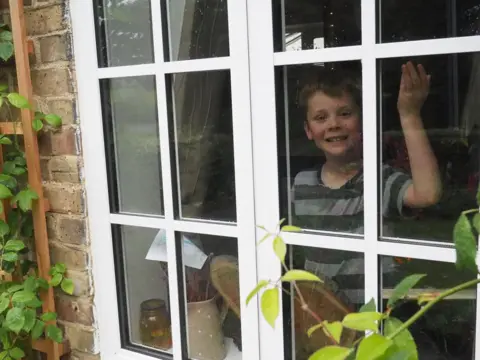 BBC
BBCWhile most children around the UK are now on their school holidays, many children with special educational needs (SEN) have already been at home for months, in some cases years.
It is a trend which England's schools standards watchdog Ofsted has described as a "national scandal".
The BBC visited four children with SEN who spend their school days at home.
William, East Sussex
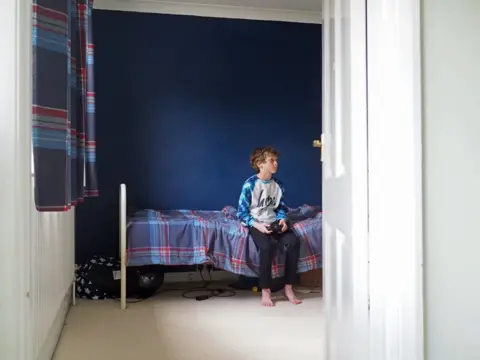 BBC
BBCWilliam stopped going to secondary school in November 2018, seven weeks after he started. He is 12 and has dyslexia.
"The class just went way too fast, and there was way too much copying off a board and copying down from books and things," he says. "And you had to do it quickly. It made me feel like I was stupid.
"I do want to learn, but it's just - it's kind of like they're not letting me learn in the way I need to learn."
Now he practises English, maths and history with his family at home, with materials that his old primary school provides. "My mum or dad normally reads the book to me and I write down the stuff that needs to be written down."
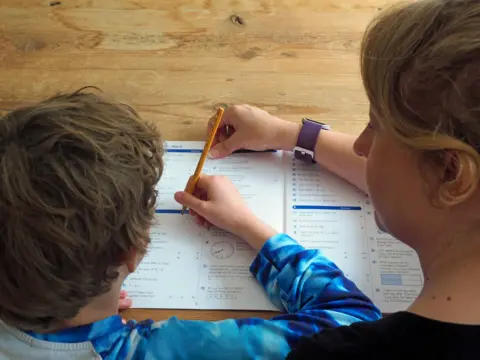 BBC
BBCAt school, he tried to keep his condition secret from his new classmates. He pretended he was doing other work in the time he had been allotted for extra English.
"I told the French group I was doing German and the German group I was doing French. I just didn't really want anyone to know that I struggled."
The psychological toll of this grew, and William was ultimately signed off school with depression by a doctor. After that, he stayed in his bedroom for two months.
But he now sees friends from school at a football club. He also loves to play cricket, rugby and computer games and to chase after his dog Teddy.
 BBC
BBCWilliam's parents want the local authority to pay for him to go to a specialist school for dyslexic children. He has already been there for a three-day trial and assessment and loved it.
"There were only five people in the class, and there were two teaching assistants. And everyone else was dyslexic too, so that made me feel a bit better."
A spokesman for East Sussex County Council told the BBC that decisions on school places for children with SEN took into account how best to meet a child's needs with consideration of how to use limited resources.
Phoebe, Kent
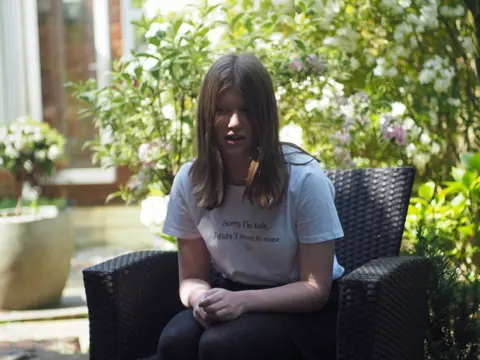 BBC
BBCPhoebe is 13 and has been off school since Easter, following a longer absence last year. Like many girls with autism, the condition became apparent only at secondary school.
"I went to a huge school, so there were always people around," she says. "It was loud everywhere, even the places where it's supposed to be quiet.
"It's hard for me to make friends and talk to people. Everyone else would have all their friends and I would just be on my own because I couldn't interact with people properly. I think they just thought I was a bit of a weirdo."
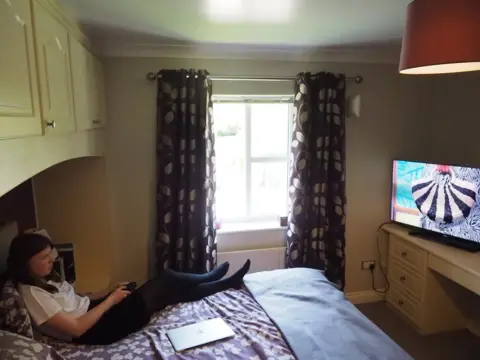 BBC
BBCAfter becoming anxious and depressed, she was signed off school by a doctor. Despite requests, the school has not sent work home, on the grounds that she is ill.
"Lots of days I'm at my Nan's house, we go shopping," she says. "But sometimes I'm here. I just sit with the cat."
Phoebe sometimes does schoolwork online and sees a tutor on Mondays. She is not bothered about going back to school, saying: "I'm fine on my own."
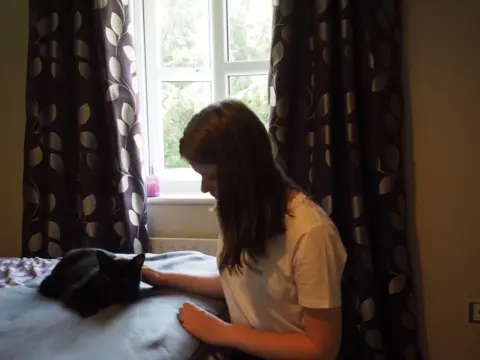 BBC
BBCHowever, Phoebe's parents have other ideas. After making appeals to the local authority, they have secured her a place at a specialist autism school from September.
Kent County Council told the BBC that it was committed to ensuring every child in Kent has access to a high-quality school place that suits their needs. It tries to place children with an education, health and care plan (EHCP) in their parents' choice of school. This is what it has been able to do with Phoebe.

Why are special needs students being educated at home?
- According to 2019 government figures for England, more than 2,700 children and young people with an education, health and care plan (EHCP) are classed as "awaiting provision" for education - a rise on 2018
- But the issue is much more widespread because most children with SEN do not have an EHCP, and some children are officially on a school roll but do not go to school
- The trend has been linked to an increase in applications for EHCPs and straitened mainstream school budgets
- The government has announced additional funds to support students with high needs - but the Local Government Association estimates the funding shortfall for SEN support could hit £1.6bn by 2021

Rowan, Essex
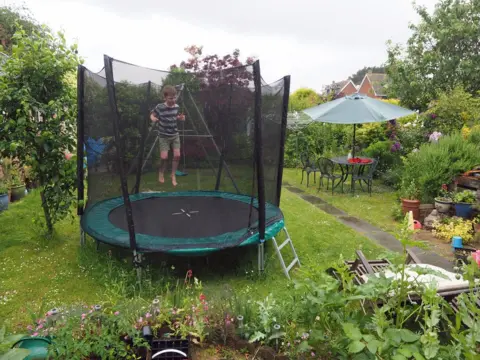 BBC
BBCRowan is eight years old and has been out of school since October 2018. He was diagnosed with autism at the age of four, and with ADHD more recently.
Rowan often repeats set phrases, and his words can be indistinct. But over a period of some minutes, he tries to relay his experiences at school.
"It was bad," he says. "Because it was noisy... because it was really really boring... because they were rude to me! I never want to go to that school again."
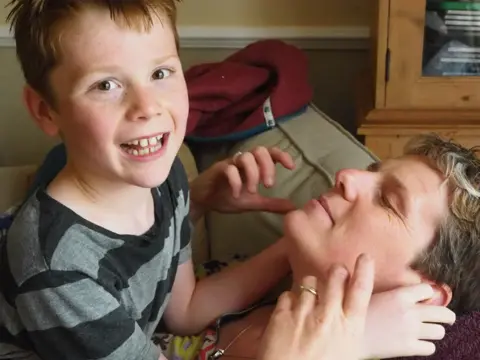 BBC
BBCRowan started mainstream primary school with an EHCP designed to ensure he had the right support.
His mother Sarah says things were going well until the school was taken over by an academy trust that changed the arrangements for children with special needs. During classes, Rowan was expected to remain in a room with other special needs children, which he found very difficult.
Rowan started saying he did not want to go to school any more and refused to enter the classroom. At an emergency meeting, the school said it could no longer meet his needs.
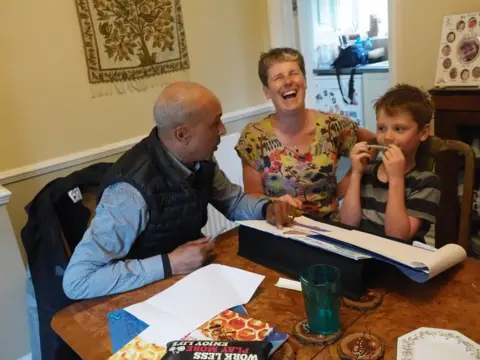 BBC
BBCNow the local authority provides a two-hour session every day with a tutor, Raymond. He and Rowan work for 30 minutes, then take a break before continuing. At the end of the week is Fun Friday, when the pair go to the park or town.
For a while, Rowan was obsessed with Mr Men characters. To help engage him in lessons, Raymond would "invite" a different character to class every day.
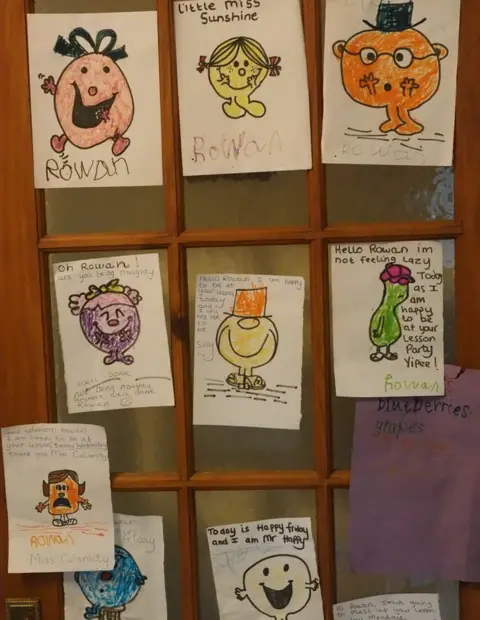 BBC
BBCIn September, Rowan will start at a special school for children with learning disabilities.
Essex County Council told the BBC it was sorry to hear of the problems Rowan has experienced and hoped to provide him with a beneficial education in the future. In response to a rise in demand, the council is developing four new SEN schools.
Michaela, London
 BBC
BBCMichaela is 13 and has been at home for most of this year. Two years ago, she was diagnosed with ADHD, autism and epilepsy.
At school, she skipped classes and frequently got into trouble. As a result, she often had to study in a separate room for children in detention, and was excluded from attending any after-school clubs.
"I don't think that my behaviour was difficult," she says, before clarifying: "If you get the right person that knows how to deal with my behaviour then I won't be difficult.
"Because when I'm happy I can be really fun to be around, like everyone else. When I'm angry I don't want people to come near me and say, 'oh Michaela, do this and do that'."
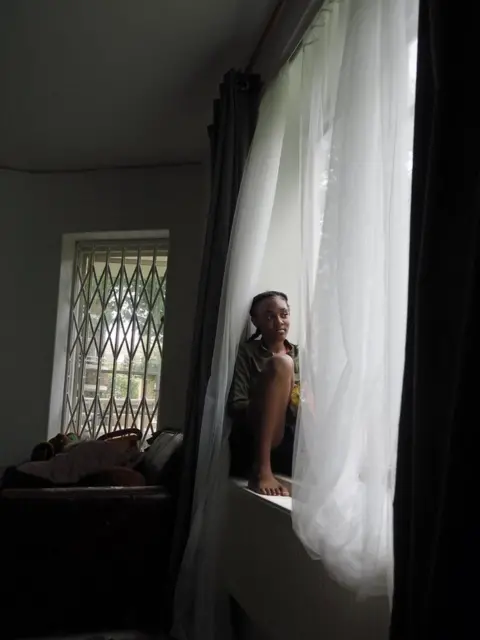 BBC
BBCShe believes that traits linked to her autism - avoiding eye contact, speaking very directly, and laughing at times deemed to be inappropriate - were interpreted as rudeness. "They just didn't really understand me," she says.
From September 2018, Michaela was sent to a separate unit for children with challenging behaviour. She was one of the youngest in the centre and the only girl in her class. "I didn't really like it because all the boys would be unkind," she recalls.
"She felt overwhelmed and misunderstood, and one day she just stormed out," says Michaela's mother Venessa. "She had a detention and I knew she wasn't going to go. I said, 'it's affecting her wellbeing, she isn't coming back'."
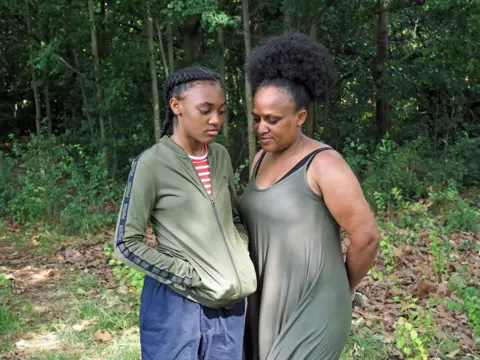 BBC
BBCIn September, Michaela is set to start at a specialist school for children with social, emotional and attachment difficulties. In the meantime, she sees a tutor at home every day. She spends the rest of her day watching online videos or peering at the street from her favourite perch on the window sill.
Occasionally, she goes for walks or meets her friends after school.
A spokesman for Wandsworth Borough Council said it had been working alongside Michaela's family to redraft her EHCP and find a new school for her. It has provided home tuition to ensure Michaela's education is not disrupted.
All photos by @williamkremer.
